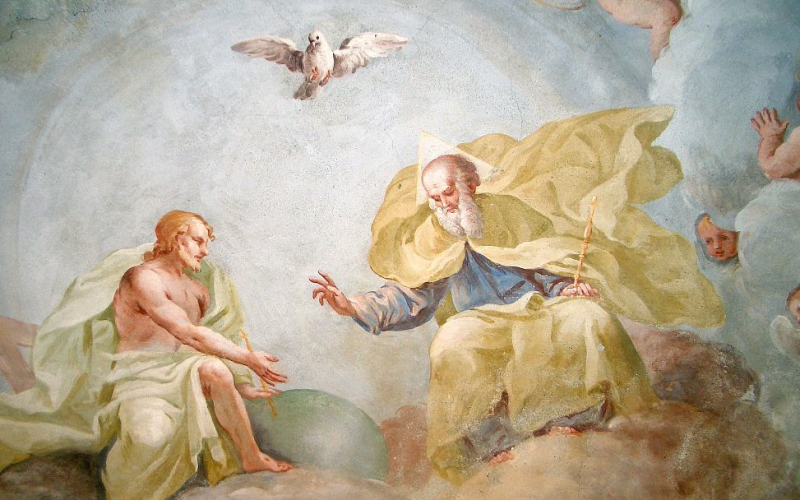 Among all the truths which the faithful must believe, this is the first— that there is one God. We must see that God means the ruler and provider of all things. He, therefore, believes in God who believes that everything in this world is governed and provided for by Him. He who would believe that all things come into being by chance does not believe that there is a God. No one is so foolish as to deny that all nature, which operates with a certain definite time and order, is subject to the rule and foresight and an orderly arrangement of someone. We see how the sun, the moon, and the stars, and all natural things follow a determined course, which would be impossible if they were merely products of chance. Hence, as is spoken of in the Psalm, he is indeed foolish who does not believe in God: “The fool said in his heart: There is no God” [Ps 13:1]. The Creed is a summary of our faith. It is not contained as such in Holy Scripture. It is a conclusion drawn from it. In the briefest possible way, it condenses our beliefs for the purposes of meditation. Christians Creeds begin with God the Father, move through God the Son, and are concluded by the Holy Spirit. The order is logical. We begin in Heaven with God the Father, we come to know Him historically through God the Son, and we embrace His will inwardly through the Holy Spirit. We begin with the Father beyond all, we continue through the Son who is with all, and we end with the Holy Spirit who is in all. And yet, our end is our beginning. The Holy Spirit returns us to the Father in the joy of unbreakable union. The threefold movement is imaged in the human soul. We begin with being, we come to know it, and we will it. Being, knowing, and willing are three faculties of soul that image God the Holy Trinity. Another way of putting it is I am, I know, and I will. Or better yet, I exist, I understand, and I love. Loving and willing are synonymous. When I will, I choose what I desire. I desire what I love. To will and to love are the same. I am, I comprehend, and I desire. To desire God is the highest expression of loving. I desire the source, origin, and cause of all my loves. In loving God, I love the creator and maker of all loveable and lovely things. In Loving God, I love the creator and making of my loving. In loving God, I love the creator and maker of all things that can be known. In loving God, I love the creator and maker of my knowing. In loving God, I love the creator and maker of all things that exist or participate in being. In loving God, I love the creator and maker of my being. The being, knowing, and loving that I actualize in my discovery of all things and myself lead me to discover God’s being, knowing, and loving at the heart of it all. For this I am truly grateful. From God’s being, knowing, and loving I discover that all things exist, having meaning, and are cared for. God the Father makes all things, defines all things, and loves all things as he tends to their wellbeing. God does not merely give all things existence and meaning; he also provides and cares for all things. Without the latter, we could discern no love and desire for the creature by the Creator. Without the latter, we could find no affection and goodwill extending from the Maker to the made. He who believes that all things come into being by chance does not believe that there is a God. Chance is accidental and not intentional. Chance shows no reason, cause, or care for the meaning and being of creatures. What happens by chance has no real cause. What happens by chance is not intended by another. But God is the cause of all else. He intends that all thing that exist should be, should have meaning, and should be loved. How do we know? We know because all things that come to be, that participate in God’s being, have meaning and are looked after according to loving laws. Loving laws are the rules that govern creatures and ensure preservation and wellbeing. Loving laws reveal patterns and norms that bring creatures to their perfection. Respective perfections may be temporal for some and eternal for others. Man’s key to eternal perfection lies in his discernment of being, meaning, and purpose. Through reason he comes to discern that the universe is ordered and arranged according to certain laws. These laws enable him to live and to live well. Through reason he comes to grasp his relation to the ordered universe and to the rules that govern his body and soul. The unity of the two will ensure his wellbeing. But first, he must realize that the universe is not made by him, not rationally ordered and given meaning by him, and not lovingly cared for by him. He must realize that the being and meaning of all things is intended by another. Man must come to see that the whole of the universe, including the miracle of his psychosomatic being, is derived from and dependent upon God. This humble admission is faith’s first submission to God the Father, known in God the Son, and loved through God the Spirit. ©wjsmartin Comments are closed.
|
St. Michael and All Angels Sermons:
|


 RSS Feed
RSS Feed